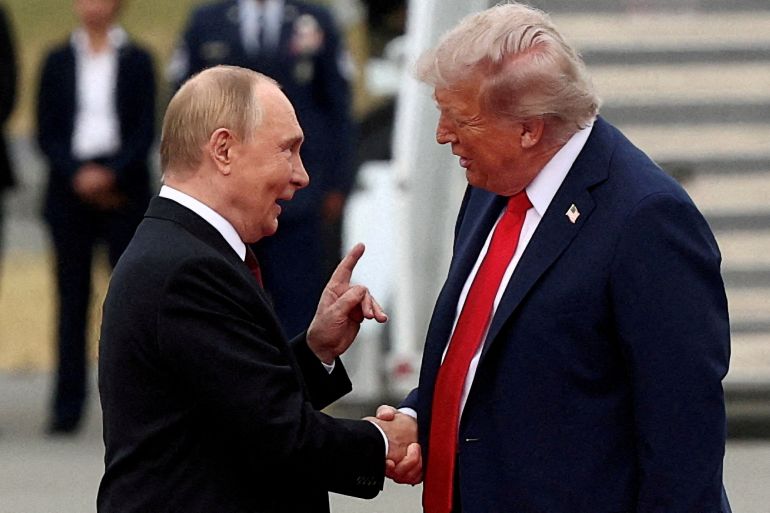Doubts emerge over Trump-Putin Budapest summit
Kremlin says there is ‘no precise timeframe’ for Ukraine ceasefire talks after Trump claimed meeting could happen within two weeks.

By Stephen Quillen and News Agencies
Published On 21 Oct 202521 Oct 2025
Save
Doubts are emerging over the likelihood of a swift meeting between Presidents Vladimir Putin and Donald Trump to discuss a ceasefire in Ukraine.
Moscow appeared on Tuesday to downplay expectations that a summit is imminent, saying that there is “no precise timeframe” and that preparations for a meeting between the leaders of Russia and the US “could take time”.
Recommended Stories
list of 3 itemsend of list
Earlier, reports in the United States media suggested that Moscow and Washington have differing views on the necessary conditions for ending the conflict.
Kremlin spokesman Dmitry Peskov told reporters there is “no understanding” in Moscow about a possible date for the planned meeting in Budapest, casting doubt on Trump’s claim that it could happen within two weeks.
“No precise timeframe was initially set here,” said Peskov. “Preparation is needed, serious preparation.”
Hopes for a near-term summit were also dimmed by reports that a planned preparatory meeting between Russian Foreign Minister Sergey Lavrov and his US counterpart, Marco Rubio, will not go ahead this week.
Russia’s Deputy Foreign Minister Sergei Ryabkov on Tuesday said it was “premature” to discuss details of the pre-meeting.
Lavrov and Rubio spoke by phone on Monday, and their conversation may have revealed some differences in expectations.
CNN, citing informed sources, reported that their meeting has been “tabled, at least for now”, with one source pointing to US concern that Moscow is sticking to a “maximalist stance” regarding its conditions for a ceasefire.
Advertisement
Lavrov dismissed the report as “unscrupulous”, but still insisted that Moscow’s position has not changed since Trump and Putin held a summit in Alaska two months ago.
“Russia has not changed its position compared to the understandings that were reached during the Alaska summit,” Lavrov told reporters.
He added that he had conveyed this directly to Rubio.
The Russian diplomat said that the place and the timing of the next Trump-Putin summit – which Trump announced after a phone call with Putin on October 16 – mattered less than implementing what the two sides agreed to in Alaska.
At the August summit, Putin said his country is committed to ending the war, but that the conflict’s “primary causes” must be eliminated for an agreement to be long lasting.
Previously, Moscow’s list of “primary causes” has included demands for territory and for Ukraine to remain “neutral” and its military capabilities to be dismantled.
‘Putin continues to choose violence’
Ukrainian President Volodymyr Zelenskyy and numerous European leaders responded by accusing Moscow of dragging its feet in peace efforts while continuing to wage “violence and destruction” on its neighbour.
“Russia’s stalling tactics have shown time and time again that Ukraine is the only party serious about peace,” said a joint statement by Zelenskyy and eight European leaders. “We can all see that Putin continues to choose violence and destruction.”
The apparent summit delay poses another setback for Trump, who has promised to end the war quickly but failed to extract concrete concessions from Moscow.
After months of wavering messages, Trump has most recently called for freezing the current battle lines as a starting point for negotiations.
That position has been embraced by both Zelenskyy and European leaders.
However, Putin has rejected multiple calls for a ceasefire and stuck to a list of hardline demands, including major territorial concessions, that Kyiv sees as unacceptable.
Ukraine says a meeting between Putin and Zelenskyy is needed to make progress, but the Kremlin has ruled out talks with the Ukrainian leader until a peace deal is practically agreed.

